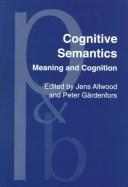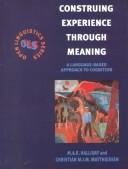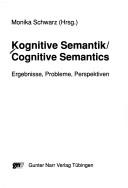| Listing 1 - 10 of 19 | << page >> |
Sort by
|
Book
Year: 1946 Publisher: New York : Harper & Brothers Publishers,
Abstract | Keywords | Export | Availability | Bookmark
 Loading...
Loading...Choose an application
- Reference Manager
- EndNote
- RefWorks (Direct export to RefWorks)

ISBN: 1282163299 9786612163296 9027299099 9789027299093 9781556198175 1556198175 9781556198182 1556198183 9781282163294 6612163291 1556198175 1556198183 9027250685 9027250693 9789027250681 9789027250698 Year: 1999 Volume: 55 Publisher: Amsterdam Benjamins
Abstract | Keywords | Export | Availability | Bookmark
 Loading...
Loading...Choose an application
- Reference Manager
- EndNote
- RefWorks (Direct export to RefWorks)
Toward the end of the 20th century, there is both a dissatisfaction with existing formal semantic theories and a wish to preserve insights from other semantic traditions. Cognitive semantics, the latest of the major trends which have dominated the century, attempts to do this by focusing on meaning as a cognitive phenomenon. This book provides different perspectives on meaning as a cognitive phenomenon. Jens Allwood presents an approach where meaning is analyzed in terms of context sensitive cognitive operations. Peter Gärdenfors examines the relationship between cognitive semantics and standa
Cognition. --- Semantics -- Psychological aspects. --- Semantics. --- Semantics --- Cognition --- Philology & Linguistics --- Languages & Literatures --- Psychology --- Psychological aspects --- Sémantique --- Psychological aspects. --- Aspect psychologique --- Lexicology. Semantics --- Psycholinguistics
Multi
ISBN: 9781107085763 1107085764 9781316084434 9781107449985 1107449987 131646878X 1316468534 1316084434 1316470288 1316469034 131646928X 1316467031 9781316470282 9781316469286 Year: 2016 Publisher: Cambridge Cambridge University Press
Abstract | Keywords | Export | Availability | Bookmark
 Loading...
Loading...Choose an application
- Reference Manager
- EndNote
- RefWorks (Direct export to RefWorks)
"This book shows that the semantic analysis of modal notions of possibility and necessity can be used to enhance our understanding of the interpretation of reports of belief or emotional state. It introduces intuitive notation and terminology to express ideas in modern theories of modal interpretation that are normally represented in complex logical formulas, effectively updates the 1960s-era link between possible worlds and the semantics of propositional attitude ascriptions, and reconciles two disparate views of the role of events in semantic interpretation, that of Donald Davidson and that of David Lewis. It reduces a host of variable behaviors of propositional attitude ascription to an intuitive and precise distinction between ascriptions that merely express a commitment to propositional content versus ones that attribute a mental state to the holder of the propositional attitude. This leads to an explanation of the nature and effects of the language disorder of fluent aphasia"--
Lexicology. Semantics --- Psycholinguistics --- Grammar --- Modality (Linguistics) --- Semantics --- Grammar, Comparative and general --- Psychological aspects --- Prepositional phrases --- Linguistics --- Psychological aspects. --- Prepositional phrases. --- 801.56 --- 801.56 Syntaxis. Semantiek --- Syntaxis. Semantiek --- Modality (Linguistics). --- Philology --- Semantics - Psychological aspects --- Grammar, Comparative and general - Prepositional phrases

ISBN: 2747507920 9782747507929 Year: 2001 Publisher: Paris Harmattan
Abstract | Keywords | Export | Availability | Bookmark
 Loading...
Loading...Choose an application
- Reference Manager
- EndNote
- RefWorks (Direct export to RefWorks)
Lexicology. Semantics --- Psycholinguistics --- Semiotics --- Semantics --- Memory. --- Imagery (Psychology) --- Cognitive psychology --- Sémantique --- Mémoire --- Imagerie (Psychologie) --- Psychologie cognitive --- Psychological aspects. --- Aspect psychologique --- Memory --- Psychological aspects --- Imagery (Psychology). --- Sémantique --- Mémoire --- Semantics - Psychological aspects
Book
ISBN: 3484302739 3111353885 9783484302730 Year: 1992 Volume: 273 Publisher: Tübingen Niemeyer
Abstract | Keywords | Export | Availability | Bookmark
 Loading...
Loading...Choose an application
- Reference Manager
- EndNote
- RefWorks (Direct export to RefWorks)
Kognitive Semantiktheorie Und Neuropsychologische Realität: Repräsentationale Und Prozedurale Aspekte Der Semantischen Kompetenz
Competence et performance (Linguistique) --- Neuro-linguistics --- Neurolinguïstiek --- Taalvermogen en taalgedrag (Taalwetenschap) --- Semantics --- -Cognition --- Neuropsychology --- Formal semantics --- Semasiology --- Semiology (Semantics) --- Psychological aspects --- Lexicology. Semantics --- Psycholinguistics --- Cognition --- Neurophysiology --- Psychophysiology --- Psychology --- Cognition. --- Neuropsychology. --- Psychological aspects. --- Neurolinguistics --- Cognitive science --- Semantics - Psychological aspects.

ISBN: 0826451527 9780826451521 Year: 2002 Publisher: London Continuum
Abstract | Keywords | Export | Availability | Bookmark
 Loading...
Loading...Choose an application
- Reference Manager
- EndNote
- RefWorks (Direct export to RefWorks)
Lexicology. Semantics --- Psycholinguistics --- Mathematical linguistics --- Semantics --- Grammar, Comparative and general. --- Concepts. --- Metaphor. --- Computational linguistics. --- Cognitive science. --- Psychological aspects. --- Betekenis (linguïstiek). --- Cognitieve linguïstiek. --- Metaforen. --- Semantiek. --- Vergelijkende en algemene grammatica. --- Semantics - Psychological aspects.

ISBN: 0226848949 0226848930 9780226848938 9780226848945 Year: 1997 Publisher: Chicago, Ill. University of Chicago Press
Abstract | Keywords | Export | Availability | Bookmark
 Loading...
Loading...Choose an application
- Reference Manager
- EndNote
- RefWorks (Direct export to RefWorks)
Lexicology. Semantics --- Psycholinguistics --- Grammar --- Anaphora (Linguistics) --- Semantics --- Reference (Linguistics) --- Connectionism --- Cognitive grammar --- Psychological aspects --- Cognitive grammar. --- Connectionism. --- Psychological aspects. --- Anaphora (Linguistics). --- Reference (Linguistics). --- Signification (Linguistics) --- Linguistics --- Onomasiology --- Connexionism --- Cognition --- Cognitive linguistics --- Grammar, Comparative and general --- Cross-reference (Linguistics) --- Semantics - Psychological aspects
Book
ISBN: 9780262026789 9780262319584 0262026783 0262319586 0262319594 0262533758 Year: 2014 Publisher: Cambridge, Mass. MIT Press
Abstract | Keywords | Export | Availability | Bookmark
 Loading...
Loading...Choose an application
- Reference Manager
- EndNote
- RefWorks (Direct export to RefWorks)
In The Geometry of Meaning, Peter Gärdenfors proposes a theory of semantics that bridges cognitive science and linguistics and shows how theories of cognitive processes, in particular concept formation, can be exploited in a general semantic model. He argues that our minds organize the information involved in communicative acts in a format that can be modeled in geometric or topological terms -- in what he terms conceptual spaces, extending the theory he presented in an earlier book by that name. Many semantic theories consider the meanings of words as relatively stable and independent of the communicative context. Gärdenfors focuses instead on how various forms of communication establish a system of meanings that becomes shared between interlocutors. He argues that these "meetings of mind" depend on the underlying geometric structures, and that these structures facilitate language learning. Turning to lexical semantics, Gärdenfors argues that a unified theory of word meaning can be developed by using conceptual spaces. He shows that the meaning of different word classes can be given a cognitive grounding, and offers semantic analyses of nouns, adjectives, verbs, and prepositions. He also presents models of how the meanings of words are composed to form new meanings and of the basic semantic role of sentences. Finally, he considers the future implications of his theory for robot semantics and the Semantic Web.
Lexicology. Semantics --- Philosophical anthropology --- Theory of knowledge --- Psycholinguistics --- Semantics --- Cognition --- Cognitive science --- Psychological aspects --- Cognition. --- Cognitive science. --- Psycholinguistics. --- Language, Psychology of --- Language and languages --- Psychology of language --- Speech --- Linguistics --- Psychology --- Thought and thinking --- Science --- Philosophy of mind --- Psychological aspects. --- Semantics - Psychological aspects --- COGNITIVE SCIENCES/General --- LINGUISTICS & LANGUAGE/General

ISBN: 3823350609 9783823350606 Year: 1994 Volume: 395 Publisher: Tübingen Narr
Abstract | Keywords | Export | Availability | Bookmark
 Loading...
Loading...Choose an application
- Reference Manager
- EndNote
- RefWorks (Direct export to RefWorks)
Lexicology. Semantics --- Psycholinguistics --- Sémantique cognitive --- --Semantics --- Cognitive grammar --- Polysemy --- Psychological aspects --- 801.56 --- Semantics --- -Formal semantics --- Semasiology --- Semiology (Semantics) --- Comparative linguistics --- Information theory --- Language and languages --- Lexicology --- Meaning (Psychology) --- Cognitive linguistics --- Grammar, Comparative and general --- Syntaxis. Semantiek --- Cognitive grammar. --- Polysemy. --- Psychological aspects. --- -Syntaxis. Semantiek --- 801.56 Syntaxis. Semantiek --- -Cognitive linguistics --- Formal semantics --- Semantics - Psychological aspects
Book
ISBN: 9780190464356 0190464356 0190464372 0190464364 Year: 2017 Publisher: New York Oxford University Press
Abstract | Keywords | Export | Availability | Bookmark
 Loading...
Loading...Choose an application
- Reference Manager
- EndNote
- RefWorks (Direct export to RefWorks)
Grammar, Comparative and general --- Semantics --- Linguistic analysis (Linguistics) --- Morphology --- Psychological aspects --- Syntax --- Language and languages --- Analysis, Linguistic (Linguistics) --- Analysis (Philosophy) --- Morphology (Linguistics) --- Morphology. --- Psychological aspects. --- Syntax. --- Linguistics --- Philology --- Grammar, Comparative and general - Morphology --- Semantics - Psychological aspects --- Grammar, Comparative and general - Syntax --- Grammar, Comparative and general Syntax --- Grammar, Comparative and general Morphology
| Listing 1 - 10 of 19 | << page >> |
Sort by
|

 Search
Search Feedback
Feedback About UniCat
About UniCat  Help
Help News
News